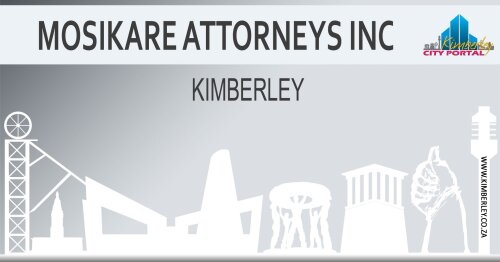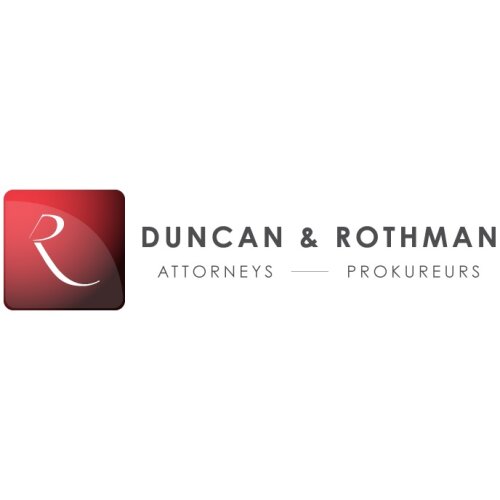Best Brokerage Lawyers in Kimberley
Share your needs with us, get contacted by law firms.
Free. Takes 2 min.
Free Guide to Hiring a Real Estate Lawyer
List of the best lawyers in Kimberley, South Africa
About Brokerage Law in Kimberley, South Africa
In Kimberley, South Africa, brokerage refers to the business of brokering or mediating in commercial transactions, especially when it involves the sale and purchase of goods, property, stocks or services. The act of brokerage is regulated by South African law, specifically under the Securities Services Act of 2004 and the Financial Advisory and Intermediary Services Act of 2002. These laws dictate the rights, responsibilities, and obligations of brokers and the parties they represent.
Why You May Need a Lawyer
Engaging in brokerage transactions often involves a lot of legal documentation and due diligence. Whether you're buying or selling, a legal professional can provide you guidance to ensure compliance with the laws and protect your interests. Situations where you may need a lawyer include: resolving contractual disputes, dealing with a breach of duty, ensuring the legality of brokerage agreements, and managing the legal aspects of international trade and brokerage.
Local Laws Overview
Some major aspects of the local laws include the obligation of brokers to hold a valid license issued by the Financial Services Conduct Authority (FSCA), to uphold a duty of care, and to disclose all necessary information to their customers. There are specific laws against market manipulation in the stock brokerage sector, as well as legal requirements for the maintenance of customers' accounts and the segregation of customer funds from those of the brokerage. A breach of these laws can result in severe penalties, including hefty fines and imprisonment.
Frequently Asked Questions
1. What are my rights as a customer of a broker?
As a customer, you have a right to full disclosure, fair treatment, and to receive sound and suitable advice that considers your financial situation and objectives.
2. What are the broker's obligations under South African law?
Brokers are obliged to hold a valid license, uphold a duty of care, disclose all necessary information, ensure they offer appropriate advice, and manage your accounts in accordance with the law.
3. Can I sue my broker in case of a dispute?
Yes, if you believe that a broker has breached their legal duty towards you or has caused you losses due to negligence or wrongdoing, you can seek legal redress.
4. Do I need a local lawyer in Kimberley?
A lawyer in Kimberley would have a good understanding of local practices and regulations. However, South African law governs brokerage, so any South African lawyer with experience in brokerage can help you.
5. What happens if a broker violates the law?
If a broker violates any laws, they might face administrative actions, fines, or criminal prosecution depending on the gravity of the infraction.
Additional Resources
The Financial Services Conduct Authority (FSCA) is a prime resource for understanding brokerage laws in South Africa. The FSCA regulates non-banking financial institutions, including brokers, and provides relevant information and resources about the sector. The Johannesburg Stock Exchange (JSE) is another resource that provides guidance on stock brokerage in South Africa.
Next Steps
If you feel that you need legal assistance in a brokerage matter, you should seek out a reputable South African lawyer experienced in brokerage laws. Most law firms offer a free first consultation, which can help you understand your situation and your rights better. It is advisable not to delay seeking legal help in complex financial matters to prevent any potential legal complications.
Lawzana helps you find the best lawyers and law firms in Kimberley through a curated and pre-screened list of qualified legal professionals. Our platform offers rankings and detailed profiles of attorneys and law firms, allowing you to compare based on practice areas, including Brokerage, experience, and client feedback.
Each profile includes a description of the firm's areas of practice, client reviews, team members and partners, year of establishment, spoken languages, office locations, contact information, social media presence, and any published articles or resources. Most firms on our platform speak English and are experienced in both local and international legal matters.
Get a quote from top-rated law firms in Kimberley, South Africa — quickly, securely, and without unnecessary hassle.
Disclaimer:
The information provided on this page is for general informational purposes only and does not constitute legal advice. While we strive to ensure the accuracy and relevance of the content, legal information may change over time, and interpretations of the law can vary. You should always consult with a qualified legal professional for advice specific to your situation.
We disclaim all liability for actions taken or not taken based on the content of this page. If you believe any information is incorrect or outdated, please contact us, and we will review and update it where appropriate.













